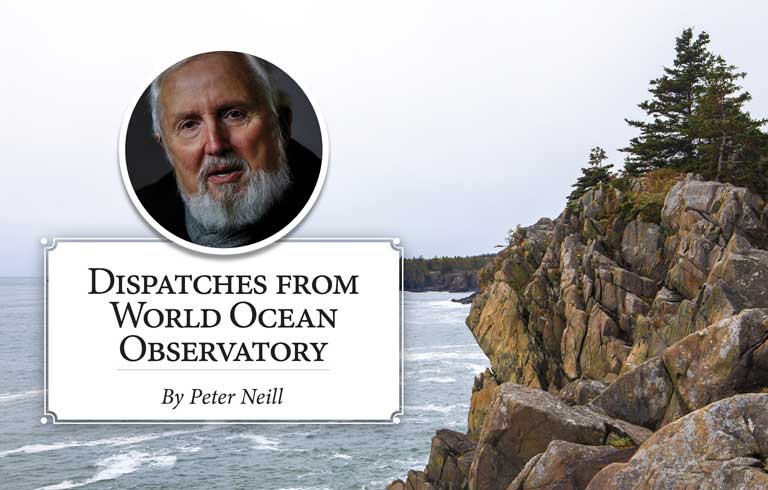People often ask me if I am a sailor. I demur, admitting only to owning a boat. I have too much awareness of and respect for real sailors to compare my level of skill.
Like many mariners, I get seasick, unless the seas are calm or I am sufficiently infused with mint and ginger. But the susceptibility is always there, the memory of past unpleasant incidents, the anticipation (both physical and psychological) of what is to come, and the thing itself—nauseating, exhausting, humiliating, just plain awful, until it’s over and you’ve found your sea legs again.
Sickness at sea is as old as seafaring itself: sailors subjected to wind, sun, heat, cold, dehydration, poor food, and all the rest. We know the tales of scurvy and such. Sometimes when we look more closely, we can sense another disease—that of loneliness, melancholy, depression, the mental illness that can result from extreme physical and psychological circumstance—until it too is over, in the best case with a successful homecoming and revival.
The thinking once was that the ocean by its vastness would dilute these things.
The world ocean is a sick sea. I have never been so definitive before. The symptoms are no longer deniable: reported spills and leaks, bleached and dying coral reefs, depleted fisheries, hypoxic zones—vast areas so oxygen-deprived that nothing lives.
I keep looking for the good news: the growing number of marine protected areas, small victories over the extraction interests, some policy or regulation that draws a line, some triumph by a local coastal community or small island state standing up to protect itself from the sickness.
The thinking once was that the ocean by its vastness would dilute these things. But we are beyond that now, holding onto that homily only as a desperate belief or a cynical justification for permitting the practices that have created the disease itself. What will it take for us to realize that to counter seasickness we must first heal ourselves?
I read recently the phrase “sea blindness,” referring at some historical moment to public unawareness of the ocean’s relevance and relationship to what takes place on land. Yes, there is shipping and trade and warfare, and yes, there is fishing and food production, but true insight and awareness remains dim, clouded by fog on the horizon, or distance from where one lives, or immediacy of these ocean manifestations directly on our daily life. If we can’t see it, or feel it, then we can’t really do anything about it.
We should be frustrated and furious. We should feel the nauseating, exhausting, humiliating reality of what is happening to our ocean. We should be outraged by governments that delay or prolong any policy, regulation, or action directed toward sustaining this essential natural environment.
We should be aware that today in the United States, Europe, the Pacific, the Arctic, indeed everywhere in this ocean world, even the progress we have made is under attack by forces of greed, dilution, revision, and retraction of anything that interferes with the exploitation or corruption of the ocean until we are left with only a toxic sea. What will it take?
There are thousands of ocean advocates, policy makers, scientists, communicators, organizers, and individuals out there, all over the world, fighting to keep our ocean safe. Hats off! Honor, respect, support, and engage with them wherever you may be. We can all do that. Join them and build their numbers exponentially.
But my sense is that this medicine is not working, is not yet strategic enough, strong enough, and smart enough to do what must be done. We are advocating for the ocean with best intentions and hope. We want to get beyond seasickness to that sustainable place, purged, free, secure. We know what must be done at every level—locally, regionally, nationally, internationally. We have plans and policies and agreements in place to free us of this disease. We know what must be done, but we are not yet aware enough, mad enough, or desperate enough to do enough about it.
We are talking about survival here. Every human need—fresh water, food, energy, medicine, security, and psychological renewal—is dependent on a healthy, sustainable world ocean. The ocean is our cure. Why would we destroy it?
I submit we are missing the resonating psychological, intellectual, and emotional connection that enables us to understand and assert with reason and passion why the ocean matters. We have bits and pieces of the puzzle. We know parts of the whole that convince us. We feel parts of the whole that move us. But it is the union of knowledge and emotion that compels us finally to understand how the ocean affects all things: climate, weather, sea level rise, coastal development, acidification, the polar regions, fresh water, food, health, security, energy, economy, trade, and community.
Consider each of these alone, and then aggregate and relate them into what becomes an integrated system of nature, politics, and social behavior that connects the world through a skein of interwoven cause and effect, the global net in which we swim, trapped perhaps on earth, surrounded by an ocean of stars. Do we want to save ourselves? Are we not all citizens of the ocean? And is not our personal and collective desire for survival and the future enough to move us to the revolutionary action and change required to make it so?
Peter Neill is the director of the World Ocean Observatory, which produces weekly radio essays that can be heard on WERU-FM, 89.9, on podcast at apple.com/us/podcast/world-ocean-radio/id425361249, and at http://www.worldoceanobservatory.org/world-ocean-radio. He lives in Sedgwick.





